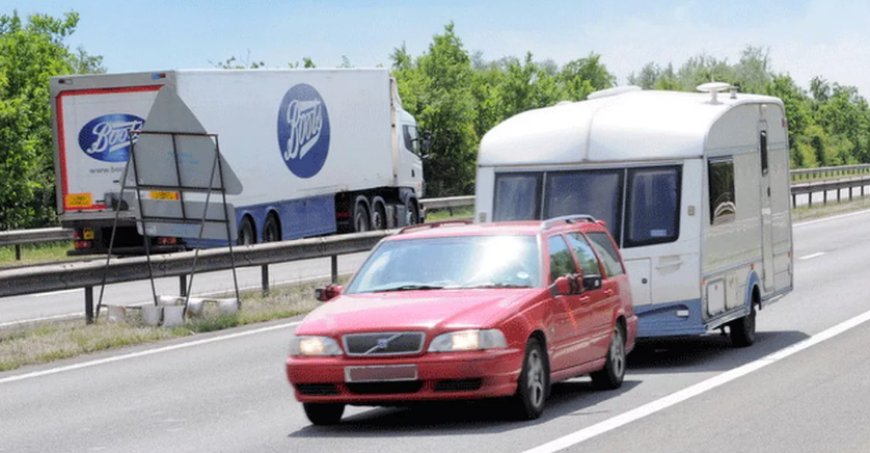What’s the Speed Limit for a Car Towing a Trailer on a Motorway?
Learn the legal speed limit for a car towing a trailer on the motorway. Discover state-specific rules, safety tips, and answers to common towing questions. Stay safe and informed!

Whether you're towing a small utility trailer, a camper, or a boat, knowing the legal speed limits is essential for your safety and everyone else's on the road. Driving a car towing a trailer comes with added responsibility, and one of the first rules drivers should understand is how fast they can legally and safely drive on the motorway.
In this blog post, well explain the speed limits for a car towing a trailer on motorways, the safety reasons behind these limits, how towing affects your driving performance, and what happens if you ignore the law. If you're new to towing or planning a road trip with your trailer, this guide will keep you informed and road-ready.
Understanding the Speed Limit: Car Towing a Trailer on the Motorway
Lets cut right to it:
In most U.S. states, the speed limit for a car towing a trailer on the motorway is between 55 mph and 65 mph.
However, this limit can vary depending on the state youre driving in and the type of trailer youre towing. For example:
-
California enforces a 55 mph speed limit for all vehicles towing trailers.
-
Texas, on some rural highways, may allow towing vehicles to travel up to 70 mph, but only under safe conditions.
-
Illinois mandates a 55 mph limit for vehicles towing trailers on tollways or interstates.
-
Montana and Nevada allow towing up to 70 mph, but the trailer must be rated for that speed.
Important: Always check state-specific laws before your trip. Just because the car next to you is doing 75 mph doesnt mean you can if you're towing a trailer.
Why Is the Speed Limit Lower for Towing Vehicles?
Towing changes how your vehicle performs on the road. The speed limits arent randomtheyre based on several important factors that affect your ability to control the car and react to situations safely:
1. Increased Stopping Distance
A car towing a trailer requires a much longer distance to come to a complete stop. The added weight behind you increases momentum, making it harder to brake quickly, especially in emergencies.
2. Reduced Maneuverability
Turning, changing lanes, and merging take more effort and space. Going too fast with a trailer makes these actions risky and increases the chance of a rollover.
3. Trailer Sway
Traveling at high speeds can cause the trailer to sway dangerously, especially in windy conditions. Speed exacerbates sway, making it harder to correct.
4. Legal Liability
If you're speeding while towing and involved in an accident, you could be held more liable, especially if its proven you exceeded the legal speed for towing.
Tips for Driving Safely When Towing a Trailer
Knowing the speed limit is just the beginning. Here are essential tips for safe motorway driving when towing:
? Plan Your Route
Stick to roads where towing is permitted and manageable. Some mountain roads or city centers are tough with a trailer.
? Use the Right Gear
If you're driving through hilly terrain, switch to a lower gear to maintain better control and reduce brake wear.
? Dont Rush
Even if the posted speed is 65 mph, you dont always need to push your vehicle to the limit. Drive at a speed that feels stable and safe.
? Leave Extra Space
Tailgating is dangerous when towing. Leave 45 seconds of following distance between you and the car in front of you.
? Perform a Pre-Trip Check
Before getting on the motorway, inspect the trailer hitch, lights, brakes, tire pressure, and safety chains.
State-by-State Guide: Speed Limits for Cars Towing a Trailer
Here's a quick overview of towing speed limits in selected U.S. states. This is not a complete list, but it shows how the law can vary widely:
| State | Towing Speed Limit |
|---|---|
| California | 55 mph |
| Texas | 6570 mph (varies) |
| Florida | 65 mph |
| Illinois | 55 mph |
| Georgia | 65 mph |
| Oregon | 55 mph |
| Nevada | 70 mph |
| Washington | 60 mph |
| New York | 55 mph |
| Arizona | 65 mph |
To find your exact limit, visit your states Department of Transportation (DOT) website or check local signage while driving.
The Risks of Speeding While Towing
Speeding when towing a trailer may not feel dangerous at first, especially on wide, open highways. But here are a few real-world risks:
? Loss of Trailer Control
Exceeding the limit may lead to the trailer fishtailing. Once sway starts, you only have seconds to correct it and sometimes, you cant.
? Increased Tire Blowouts
Trailer tires are not designed for high-speed travel like car tires are. Driving faster than the tire rating increases the chance of a blowout.
? Brake Failure
Brakes can overheat and fail, particularly when going downhill or in stop-and-go traffic.
? Insurance Voids
Many insurance companies may reduce coverage if its proven you were driving above the legal towing speed at the time of a claim.
What About the Trailer Rating?
Did you know that trailers also have speed ratings?
Most trailers have a placard indicating their maximum safe speed. This can vary by tire type and axle strength. Many are rated for no more than 65 mph, so even if the road allows more, your equipment might not.
Ignoring this can:
-
Wear out tires prematurely
-
Cause overheating of trailer brakes
-
Void your trailers warranty
Technology Can Help
Todays vehicles often come with towing assistance features, such as:
-
Trailer Sway Control
-
Towing Mode for Transmission
-
Backup Assist Cameras
-
Blind Spot Sensors for Trailers
These features are great, but theyre not a substitute for responsible driving. Always respect the speed limit and keep an eye on your trailer through your mirrors.
What the Law Says: Federal and State Guidelines
There is no single federal speed limit for cars towing trailers. Instead, its up to each state to regulate.
However, here are a few general rules that apply across most states:
-
If you're towing, stay out of the leftmost lane unless you're passing.
-
You must use trailer brake lights and turn signals.
-
All trailers over a certain weight must have working brakes.
-
Trailers must be properly registered and plated.
For a more comprehensive list, consult the American Association of State Highway and Transportation Officials (AASHTO) or your state DMV.
Final Thoughts
Towing a trailer doesn't mean your journey has to be slow and frustrating. It means being aware, patient, and cautious especially when you hit the motorway.
To recap:
-
Most U.S. states limit towing speed to 5565 mph.
-
Always check your states towing laws before driving.
-
Speeding while towing is both dangerous and potentially illegal.
-
Use common sense just because you can go fast doesn't mean you should.
By understanding and respecting speed limits for cars towing trailers, youll enjoy a safer and smoother ride and help everyone on the road do the same.
FAQs
1. Can I drive in the fast lane while towing a trailer?
In most states, no. Vehicles towing a trailer are typically restricted to the right or middle lanes on highways. Only use the left lane to pass when legally permitted and safe.
2. What happens if Im caught speeding while towing?
You may receive a traffic citation or fine, and in some cases, points on your license. Repeated offenses could lead to higher insurance premiums or even suspension of your license, depending on the severity.
3. How do I find the speed rating of my trailer tires?
Look for the tires sidewall. Youll see a letter code (like L, M, or N) that corresponds to a maximum speed. Check your trailer manual or tire manufacturer's website for the exact speed range.



































